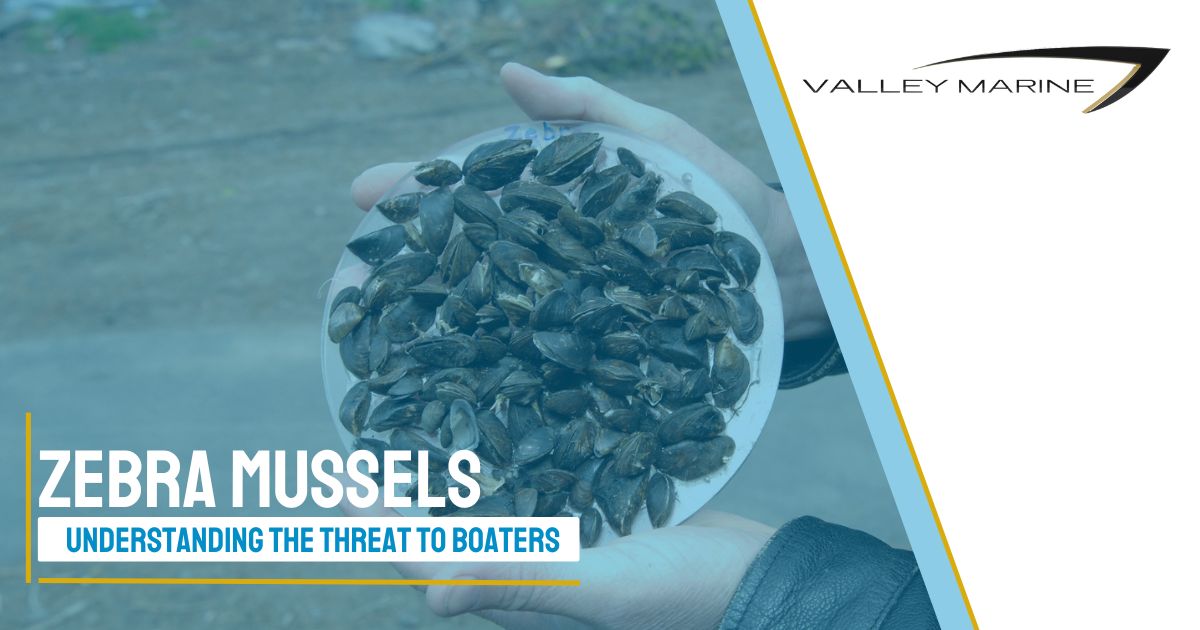Boating is a popular pastime in North America, but did you know that a tiny invader known as the zebra mussels can cause big problems for boats and trailers?
Zebra mussels, also known as Dreissena polymorpha, are small freshwater mussels that were first discovered in the Great Lakes in the 1980s. These mussels have since spread to many other water bodies across the United States, and they can have serious consequences for boaters and the environment. They can cause damage to boats and infrastructure, such as marinas and locks and can also damage engines and cooling systems by clogging water intake systems.
In this post, we will discuss what zebra mussels are, where they are found, and how they affect boating. We will also cover tips for preventing the spread of zebra mussels and protecting our waterways.
What are zebra mussels and where are they found?
Zebra mussels are small freshwater mussels that are typically less than an inch long. They are named for their distinct striped pattern, which can vary from yellow to brown.
These mussels are filter feeders, meaning they filter tiny particles from the water to feed on. They are native to Eastern Europe and were first discovered in the Great Lakes in the 1980s. Since then, they have spread to many other water bodies across the United States, including rivers, lakes, and reservoirs.
Zebra mussels are known to live in large reproducing populations, and they can quickly colonize new areas.
How do zebra mussels affect boating?
Zebra mussels can cause problems for boaters in a number of ways. One of the biggest concerns is that they can clog water intake systems, which can cause damage to boats and infrastructure, such as marinas and locks.
They can also damage engines and cooling systems by clogging water jackets and raw-water inlets. In addition, zebra mussels can make boating more difficult by creating slippery surfaces on boat ramps and dock pilings.
Zebra mussels can also have serious ecological effects. They can outcompete native mussels for food and space, and they can alter the food web in ways that are harmful to native species. They can also filter water so efficiently that they can change water clarity and reduce the growth of aquatic plants.
They can also attach to boats and trailers with byssal threads which can be difficult to remove.
How to prevent the spread of zebra mussels
There are several ways to prevent the spread of zebra mussels. One of the most important things boaters can do is to inspect and clean their boats and trailers before moving between bodies of water. This includes removing any visible mussels, as well as draining all water from the boat and equipment.
Boaters should also take care not to move any mussel-covered rocks or other materials from one body of water to another.
It is also important to be aware of state and federal regulations related to the transport of watercraft and equipment. Some states have laws that prohibit the transport of watercraft without first being inspected and decontaminated. In addition, many states require boaters to drain their boats and equipment before leaving a body of water.
Decontamination facilities are available in areas with zebra mussel populations, and boaters should take advantage of these facilities if they are available. These facilities use high-pressure water, hot water, and/or chemicals to remove mussels from boats and trailers.
Removing Zebra Mussels from Your Boat and Trailer
If you suspect that your boat or trailer has been contaminated with zebra mussels, it is important to remove them as soon as possible. This is important to prevent the spread of zebra mussels to other water bodies and to avoid the potential damage that they can cause to your boat or trailer.
One method to remove zebra mussels is to use a stiff brush and hot water. This method works well for removing mussels that are attached to the surface of your boat or trailer. Start by removing as much of the visible mussels as possible using a stiff brush. Next, rinse the boat or trailer with hot water (at least 140°F) to remove any remaining mussels.
Another way to remove zebra mussels is by using specialized cleaning solutions. There are various cleaning solutions available that are specifically designed to remove zebra mussels. These solutions can be applied to the boat or trailer and left to sit for a certain period of time before rinsing off.
In closing, it is important for boaters to be aware of the threat that zebra mussels pose and take steps to prevent their spread. By working together, we can protect our waterways from this invasive species and ensure that boating remains a safe and enjoyable activity for all.
Whether it’s Malibu, Southbay, Axis, Cobalt, or Boston Whaler, Valley Marine is ready to help get your boat in top-notch shape today. Need some help with your boat service? Contact Valley Marine’s award-winning team of marine technicians for in-shop or on-location boat service toda


